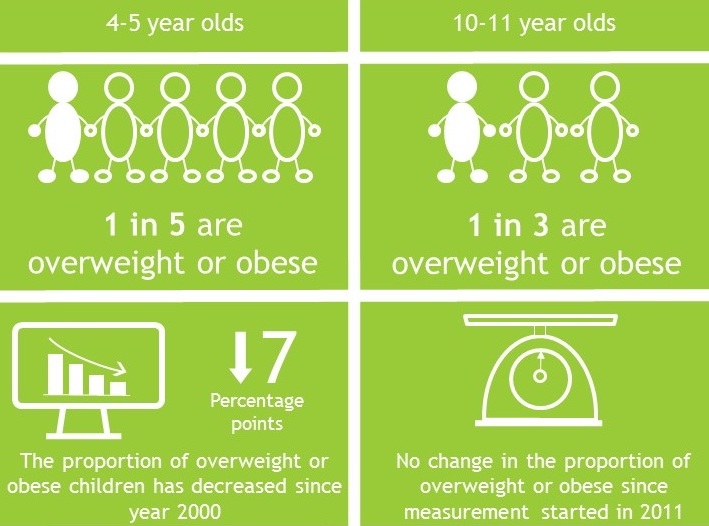

Obesity levels in primary school children are “still too high” – and the best way to fix them is by instilling healthy habits from as early as birth, the States’ Health Department has said.
Head of Health Improvement Martin Knight’s comments come following the recent revelations that one fifth of Reception Class-aged children and one third of 10-11 year olds are overweight or obese, according to the annual Jersey Child Measurement Report.
While Mr Knight said that the figures for four to five year olds were, “…going in the right direction” – having dropped 7% since 2000 – he expressed disappointment that the 10-11 group had “plateaued” since 2011.

Pictured: Results from the Report, for which around 2,000 children were surveyed. (Photo: Statistics Unit)
Following the findings, the department are now set on “shifting the curves” – both bodily and numerical – in children, not only because they’re a “vulnerable group”, but because, “…dietary risk factors have now overtaken lifestyle behaviours like smoking and alcohol as one of the biggest factors of burdens of disease on healthcare services both nationally and internationally.”
The way to tackle this, he says, is by changing, “…the eating habits we develop in younger years and take forward into the future, …[as] being overweight and obese leads us on an unhealthy trajectory through all of our lives."
“As children grow older, they have increasing access to unhealthier foods - foods higher in saturated fats and sugars - and that means that they’re more likely to become overweight or obese. That’s then transferred to our adult population. What we’re seeing is that over 50% of our adult population are overweight or obese,” he stated.
 Pictured: Easy access to foods high in saturated fat can be an aggravating factor in childhood obesity, Mr Knight said.
Pictured: Easy access to foods high in saturated fat can be an aggravating factor in childhood obesity, Mr Knight said.
As a result, the Health Department are currently preparing a Draft Food and Nutrition strategy and have recently received investment to support prevention programmes – some of which even look to target women before pregnancy as part of their ‘1001 Days Agenda’.
“We’re look[ing] at the earliest points to support mums in the Island even before they become pregnant, all the way through – supporting breast feeding in the first instance as far as possible, babies converting from milk onto solids, and encourag[ing] increased consumptions of fruits and vegetables, for example.”
Collaboration with the Education Department is also key, Mr Knight says, which sees the two departments partner to cultivate science and PSHE curriculums promoting healthy living, as well as promoting “interactive” initiatives like “smoothie days and stuffing pita pockets.”
The findings also showed that children from ‘urban’ environments like St Helier were more likely to be overweight or obese than those from rural parishes.
Pictured: Green spaces like Millennium Park, for example, are crucial for children living in urban areas, Mr Knight commented.
“In these environments, there are higher levels of deprivation and poverty, we get less access to green space, and higher exposure to fast food outlets,” Mr Knight commented, adding that such considerations should influence the States’, “…wider social policy decisions.”
By adopting such initiatives with a holistic approach – an equal collaboration between schools, the States and parents – the next generation should be able to swerve off, “…the causal path to future diabetes, coronary heart disease, and cancers.”
“If we can turn the curve on [children’s] weight and obesity, we can have a healthier population and increasingly longer and healthier lives for the people of Jersey.”
Comments
Comments on this story express the views of the commentator only, not Bailiwick Publishing. We are unable to guarantee the accuracy of any of those comments.